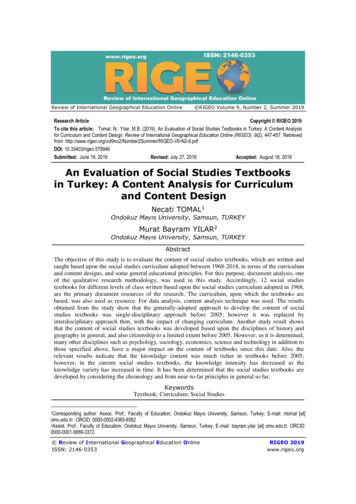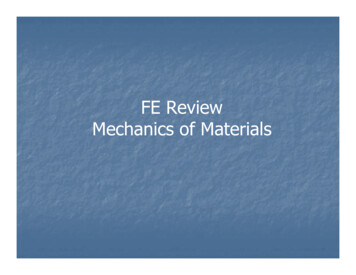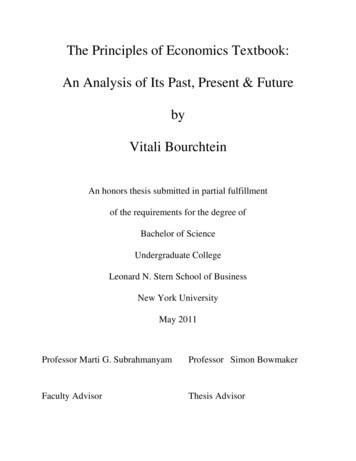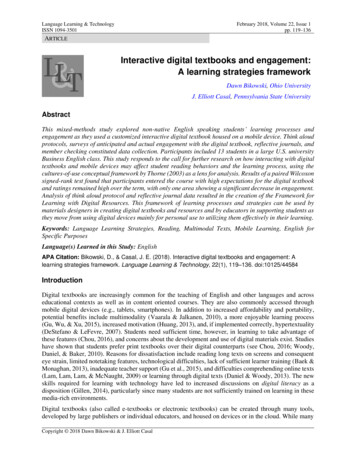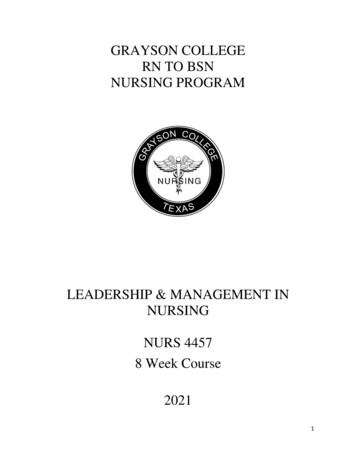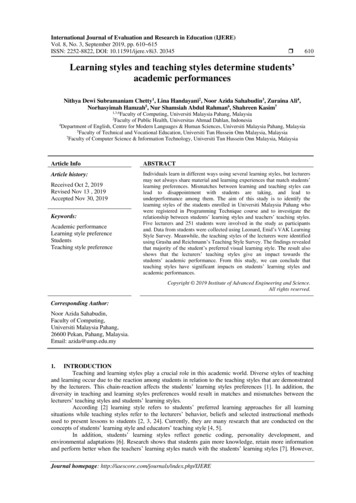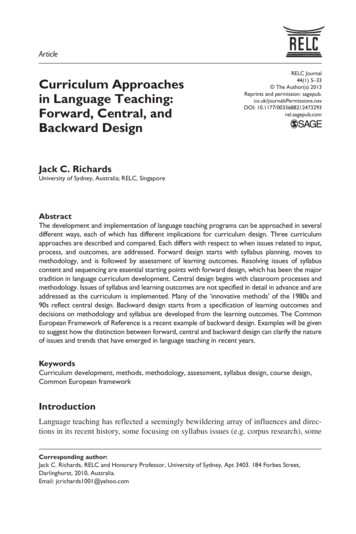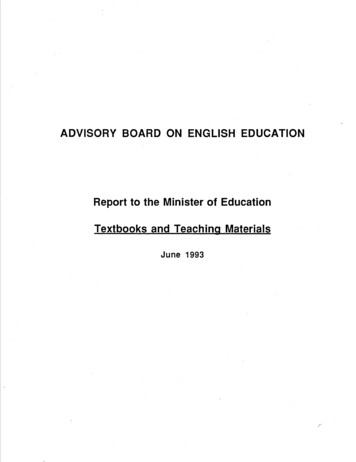
Transcription
ADVISORY BOARD ON ENGLISH EDUCATIONReport to the Minister of EducationTextbooks and Teaching MaterialsJune 1993
THE ADVISORY BOARD ON ENGLISH EDUCATIONReport to the Minister of EducationJune 1993Textbooks and Teachina Materials1.IntroductionThe Advisory Board on English Education was asked to study the issues of theavailability, accessibility and suitability of the textbooks and teaching materialsprovided and produced for the English language public school system inconformity with the objectives and programs of the Regimepedagogique.When the Advisory Board undertook this exercise, the most striking feature ofthe textbook "problem", as expressed in anecdotal form by all those consulted,was the uneveness of accessibility and a wide spread confusion about wh.atwas or was not available. These two factors have con ributed to a sense ofinsecurity in the implementing of programs and a questioning of the suitability ofthe textbooks and teaching materials which do come on the market.Wide consultation with Ministry officials, educators in the field, including aquestionnaire sent out to Quebec's 300 English schools for an evaluation of theavailability and suitability of the teaching texts at their disposal, confirmed theinitial impression. It also brought to light areas of particular concern and helpedfocus the Board's attention on what could be done to put access to goodEnglish language teaching texts on a more simplified and secure footing.The study was carried out keeping in mind the four principles of education:teaching, learning, doing, evaluating. It quickly became evident that there aremany issues relating to the subject of textbooks and teaching materials in theEnglish school sector.The source of English language textbooks was therefore explored. The processfor producing teaching materials for the English school sector was examined.And finally,· the suitability question was addressed through the relationship oftextbooks and teaching materials to the meeting of the pedagogical objectivesof the curriculum.1
2.The need for textbooksIt is the view of the educators whom we consulted that not all programs haveuniform needs in the way of teaching materials. In other words, from a strictlypedagogical point of view, some courses need textbooks, some do not; somerequire different materials or a variety rather than a single text.The need for an "official" textbook for the successful completion of the teachinglearning-knowing-evaluation process can also be a function of a teacher'smethods and preferences. Many educators believe that some programs andsubjects are best taught and learned using a multiplicity of material and that the"official" textbook adds little to the teaching-learning process. English languagearts is one such area. Many subjects at the primary level fall into this category.In social studies, moral and religious education, a many-sourced approach isconsidered preferable. As the teaching guides to courses and programmes aredetailed and specific, the flexibility needed to adjust the teaching-learningprocess to different kinds of classroom clienteles can be better achievedthrough a wide choice of teaching materials.There is no question however that for core programs at the secondary level,other than language arts, a textbook in the hands of each student is not only thelaw, it makes good pedagogical sense.Core subjects, particularlymathematics, science. and social sciences at the secondary level are amongthe areas for which textbooks are essential. A rule of thumb is that a textbookbe required as part of any course sequence which ends with a provincialevaluation. As all students take the same examination, it is clear that theyshould all be working with a textbook that meets the program requirements. Itgoes beyond the issue of fairness. If an examination is based on the course asdetailed in a particular textbook, the students for whom the book or a closesubstitute is not available are obviously at a disadvantage, so are theirteachers.Many teachers have to teach in areas which are not their specialty eitherbecause they teach in small schools and must teach several subjects or mustteach subjects for which they were not originally trained. Having a textbook toguide them through the new material is an important factor in what is beingtaught, as well as what is being learned. While the MEa recognizes that inservice training for teachers prior to the introduction of new course material isessential; this does not obviate the need for the textbook.2
Mention should be made here of the role textbooks play in a child's learningprocess away from school at both the primary and secondary level. For parentsto be able to help their children, they need to know what the child is supposedto be learning. A textbook fills this need. The value of a textbook in this contextcannot be underestimated.3.Textbooks, new curriculum and provincial examinationsPrograms already in place in the French sector often move into the Englishsector under the pressure of course requirements for the purpose of provincialexaminations but without the corresponding textbooks covering the objectivesand contents of the program. The introduction and implementation of newprograms requires planning which must include the availability of textbooks andteaching materials. While no officially approved book is available, schoolboards are in a dilemna about purchasing course materials. They may chooseto delay rather than invest in other materials in the interim, leaving teachers andtheir students at a disadvantage.We therefore recommend that a new curriculum for which atextbook is needed be implemented only if at least one approvedtextbook covering the course is available and that a provincialexamination be given only after an approved text book has beenavailable for a year. Local examinations would be a substitute inthe interim.4.Sources of English textbooksThe next step will be to find a solution to the absence of suitable Englishtextbooks at certain levels in some of the core programs. The most glaring gapsare to be found in the areas of mathematics and science. For example,teachers have had to produce materials to compensate for the lack of a textbookfor Math 436. But history, geography and economics are also cited asinadequately covered. If the objective is to have at least one book available forcore subject areas, then modifying and improving existing procurementmechanisms is essential.3
aPrograms guide the selection of text. Once programs are established, theirobjectives are sent in detail form to publishers who undertake the gathering,compiling, organization and editing of the information required for anaccompanying textbook. For the French sector this is a straightforward processand one that often produces several textbooks covering the same material. Thecaptive market is large enough to warrant competition among publishers tobring out the most popular book. The same operation in the case of textbooksfor the same programs in English is a different matter. The English marketbeing one tenth that of the French, it is rarely worth a publisher's while to repeatthe operation in English.In some cases, the Ministry has subsidized translations of the French textbooks.By the time these translations are on the market, there is no guarantee thatschool boards will buy them in sufficient numbers to cover the cost. The outlayfor school boards is considerable, an update of the original material may be inthe offing and school boards hesitate to buy at that stage. School boards withthe resources to undertake the preparation of textbook level course materialhave, at times, developed their own. In those instances, there are nomechanisms to ensure that the textbooks are readily available and accessibleto the whole English network.English textbooks are also available on the North American market. If theseare written for other jurisdictions, they may not cover the course objectivesadequately. Textbooks which adequately cover the course material are eligiblefor use once approved by the Ministry. Finding them and getting them approvedis time consuming. The process leaves too much to chance.A systematic process for acquiring English textbooks covering the Regimepedagogique courses being given in English must be found. A book which isbelow the standards of what is being used in the French sector or whichbecomes available so long after the program has been initiated that the Frenchsector is already using a corrected, updated version, is simply not good enough.Furthermore, translations often are not the most appropriate approach.We recommend that the Minister take the necessary steps to ensureaccessibility to at least one approved textbook within a reasonabledelay and comparable time frame to the French sector after a newprogram is authorized and that school boards be reminded of theirobligation to provide them.4
Experienced consultants/teachers can identify appropriate material in arelatively short time. If no existing book is found to be appropriate and if nopublisher is found to produce a new book for a particular program, acollaborative process should come into play bringing together expertise fromacross the English school network. A committee composed of educators fromthe Committee of Anglophone Curriculum Responsables, subject associationsand consultants/teachers in conjunction with a publisher should be invited tooversee the production of a suitable book. In this case, publishers would needa subsidy to make the project worthwhile for them to undertake. Publisherswould submit bids, and for the subject matter in question, only oneproject/publisher would be chosen in order to maximize the available marketand minimize the size of the subsidy.As the choice of material emanating from such an operation would be heavilyinfluenced by educators from the sector to which the book is destined, thoseeducators and the network to which they belong would be more accountable forthe suitability of the product than they are under the present arrangements orlack of them. With accountablity comes a feeling of ownership that can havenothing but a positive effect on teaching and texts alike. The relative purchasecosts of English textbooks must be the same as the French textbooks. ifsubsidies are given for publication.We recommend that the MEQ subsidize the production of Englishtextbooks and facilitate the collaboration between publishers,teachers and consultants.5.Teaching materialsTeaching materials of a more general kind are also of some concern. Asteaching approaches and methods have a direct bearing on learning, Englishschooling would benefit greatly from more participation in.the formulation ofmaterial by its educators. One very obvious sector of linguistic deprivation is thepaucity of materials for vocational training. They are predominantly Englishworld wide. And yet, they are not available here.As mentioned above, there is concern that a single text is limiting in certainsubjects, especially interpretative subjects like social studies. Complaints areheard about the lack of world perspective in geography and history. Enrichingmaterial to supplement the basic objectives of a course can be produced byschool boards but only the big boards have the resources to do this on anysignificant scale.5
More flexibility is needed in the gathering and choice of teaching materials tooff-set cultural disparities and give full rein to the professionalism of teachers.For the English sector this means a more hands on approach to how subjectsare taught in its schools. The how must necesarily include the what. Ways musttherefore be found to give English-speaking educators more say in whatteaching materials are best suited to the teaching of the broad objectives of theRegime pedagogique.Teachers should be recognized as the backbone of a healthy education system.Greater use can be made of their expertise and experience in the searching outand production of teaching materials. Subject associations have been able toproduce materials to share among schools. Committees of teachers organizedby disciplines and established to research what is available in Canada andNorth America can be a cost effective approach. The "cooperative" modelwould be an effective mechanism for meeting the needs of Quebec's Englishschools.This approach requires support from the boards and the MEQ. Teachers mustbe given the necessary time to participate in these activities. The experiencewould be one leading to professional growth. The resulting materials wouldthen serve as teaching aides in giving courses more breadth, depth and culturalrelevance as well as giving teachers more ownership in meeting the academicneeds of the community they serve.We therefore recommend that these cooperatives be established forcore subject areas as required and that teachers across thenetwork be engaged to serve on them.This recommendation is inspired by the vision that teachers should be able toparticipate fully in the educational process. Such participation would removethe need for straight translation of teaching materials and related written matterwhich is an issue to which thought should be given, as this is rarely the mosteffective way of resolving the exchange from one language to the other.Objectives are more readily comprehended and mastered if their descriptionand content originate in the language of their teachers and learners. It is amatter of attaining the same pedagogical objectives, of learning about the samethings in the cultural idiom to which one relates. No new staff would berequired, only the budget to cover release time. It is a matter of using thehuman resources already in place to provide more effective education.6
6.Evaluation toolsA case in point is the approach to evaluation. In the interests of uniformevaluation, provincial exams are prepared in French and then translated intoEnglish for the English language sector. It is often an awkward, sometimes ahard to understand transposition. EveQ with identical text and teachingmaterials, the language differential in the wording of these evaluations putsEnglish-speaking students at a disadvantage if the English examination is aliteral translation of the French.We therefore recommend that the course objectives to be eval uatedin any set of exams be jointly established but that the examsthemselves be conceived and prepared in English for the Englishsector and in French for the French sector, with a control groupmade up of both language components checking the compatibilityof the two versions.The control group will ensure that both English and French exams are testingthe same objectives in order to avoid the perception that one set is somehoweasier than the other. The variance between exams drawn up in English and inFrench should be no greater than the difference which already exists betweenthe exams given in June and those offered in August evaluating the exact samecourse work.7.Information exchangeOne of the most widespread complaints heard from teachers in the Englishsector is the difficulty inherent in finding out what teaching materials areavailable in their disciplines. Increasingly, the availability of consultants tohelp teachers is limited to the larger boards and to the core subjects. Manyschools report little or no access to consultants. Schools and teachers in somerural areas are especially isolated. The need for a method for sharinginformation and materials is obvious. Teachers should have access toinformation when they need it rather than simply receiving information at timeswhen it is not relevant to them.7
Electronic networking offers a solution which can be both affordable andrelatively easy to use and could maximize existing consultant services. Byproviding a link and information for the whole system, such a network would bea lifeline for our schools.To begin, with it would provide an inventory ofavailable textbooks and teaching materials of all kinds, including computer andaudio-visual, with complete information as to sources and costs. The inventorywould be readily updated and could grow with the addition of materials whichteachers themselves have developed or found to be useful thus providing adynamic process for teacher input and for sharing across the entire network ofEnglish schools.We therefore recommend that an electronicallyaccessibledatabase be established which includes all authorized textbooksand teaching materials, including computer software and otherelectronic resources available, their sources and costs, and whichincorporates a dynamic, interactive process for the addition oflocal teacher input to promote creativity and sharing.As a partnership endeavor, with responsibility shared by faculties of education,school boards and the MEQ, the total community comprising the English sectorwill participate and benefit. It should be noted that McGill University's Faculty ofEducation has the expertise to provide the leadership.8.Education and modern technologyTeachers need new tools to succeed in providing students in their classroomswith sources of information and the knowledge of how to access thatinformation. They also need the training and support required to develop thenecessary skills to make this possible.Almost all of Quebec's English schools have some computer hardware, leadingus to the conclusion that there is at least one person in each school who hassome expertise in its use, even though lack of training for teachers is reportedas a significant limitation. (Survey, Annex 2) The existing although limitedavailability of equipment and expertise is a small beginning which should bebuilt upon. The possibility to link classrooms and therefore to share programs isfeasible and cost effective. Even schools at considerable distances can belinked, making it possible to share information, expertise and resources amongany number of sites.8
A "National Network for Learning" is presently being organized under theleadership of a Toronto-area school board in collaboration with other schoolboards, universities, industry and governments. This network, linking teachersand learners across Canada, is intended to focus at first on improvingperformance in mathematics and science using the latest informationtechnology to provide global access for teachers and learners. This is one ofseveral such networks being proposed. By creating learning environments inwhich teachers and learners develop collaborative and communication skillsand the ability to use technology for the world of tomorrow, participating schoolswill be able to support learning for students of all ages. Such a network iswithin reach of Quebec schools and it is important that our schools be part ofsuch an endeavor.Furthermore, the use of technology such as satelite communications or videoconferencing in partnership with business must be explored in order to makeprogress in the area of distance education, professional development and toeliminate the extreme isolation of some English schools. Access to resourcesand support by linking schools and universities, for example, is realizable.Radio Quebec's English branch which is actively serving English schools hastremendous potential as an educational tool. It requires additional support.·tocarry out its mission not only to seek and disseminate material but to put thelatest technology at the disposal of our schools. The need to produce materialspecifically geared to English schools should be supported, as is done forFrench schools.A few schools are making optimum use of their electronic capability to supportteaching. One elementary school has reported a greatly enhanced scienceprogram across the grades and the elimination of science textbooks as theresult of the use of computer and laserdisk technology. A number of schoolsare engaged in programs which link students across North America in science,mathematics and geography studies. In order to make better use of the limitedresources available to our schools, a careful examination of the electronicteaching and learning resources is essential. Experts report that distance isonly one of the obstacles which can be overcome through appropriate use oftechnology. Judicious use of computer technology supports individual learningand student confidence and motivation by offering flexible, interactive learningsequences, guided practice and coaching and by permitting instant feedbackand self-assessment.9
We therefore recommend that an action plan be developed toprovide our schools and our students access to the full range oftechnological learning opportunities, to increase school learningresources and materials, to improve professional developmentopportunities and to provide mutual and professional support.9.Concl usionIn conclusion, Madam Minister, it is important to say that the Advisory Board'sdiscussions have taken place within the context of English education as anintegral part of the Quebec system of education. Our recommendations aremade with a view to making English schools more self-sufficient and Englishsystem mOre cohesively supportive. This should make it more not less costeffective (always an issue in times of shrinking resources). It should also makeit more of an asset to Quebec school education in general. It was never ourintention to suggest any form of separate structural development for the Englishschool system, only that the existing structures be made flexible enough toallow English educators some responsibility for the tasks that they can bestperform in the interests of their students and of the excellence of pedagogicalperformance ip general.Several of the recommendations, although targeted to the terms of our Englisheducation mandate, are in no way exclusive. From our collective experiencewe have come to believe that technology will have to playa greater and greaterrole in the teaching, .learning, knowing, evaluation sequences of traditionaleducat on. A pilot program in the English sector is of value to all Quebecschools. The technological sharing of information and knowledge as well asthe use of technological tools in the teaching, learning and understanding ofsubject matter is becoming an increasingly important factor in the concept anddelivery of schooling that can give students today the kind of skills they willneed tomorrow. This is not an exclusively "English" issue. It is one which mustbe explored together in the interests of Quebec education at large.Respectfully submitted,Gretta Chambers, Chair10
Appendix ITHE ADVISORY BOARD ON ENGLISH EDUCATIONOperation and Procedures. February - June 1993The Advisory Board on English Education. appointed by the Minister ofEducation in January 1993, held its first meeting on February 25. 1993.At the request of the Minister, the subject of Textbooks and Teaching Materials:availability and suitability in the English schools was the focus of the Board'sstudy and deliberations from February to June 1993.The Advisory Board,·composed of fifteen members representative of all aspectsof English education in Quebec including teachers, parents, school and boardadministrators and commissioners, is chaired by Gretta Chambers. Themembers are Francesca Arpin, Hugh Auger, Maria Baldessare, Mich lineBouchard. Sylvia Chesterman, Ann Cumyn, Carl Dobbin. Donald Houston.Diane McLean, Michael Palumbo, Joseph Rabinovitch, Peter Riordon. WendySturton, Leo Venditti, William Young and Janyne Hodder, ex officio.The Board met with principals, teachers, consultants, administrators andmembers of the McGill Faculty of Education during the course of its firstmandate. In order to facilitate consultation and to hear a variety of concernsand opinions, a number of meetings were held in schools and at McGillUniversity's Faculty of Education.A survey of all English schools in Quebec yielded further information on theavailability and suitability of textbooks and teaching materials across thenetwork, as well as the extent of computer access in the schools.The Advisory Board gratefully acknowledges the assistance given by thefollowing persons: Phyllis Koper Naggiar, Director, DPLA, MEQ; MichelDeCelles. Directeur, DGRDFD, MEQ; Bob Hardon, Principal, and teachers ofFrancesca Cabrini School; Rocco Barbieri, Consultant, CECM;JohnWeideman, Principal, District of Bedford;Anthony Lacroce, Principal,Rosemount High School; M. Bambek. Principal, and members of staff of St.Pius X High School; Graham Jackson, Gary Thompson, Dominic Martini, LacHanifi. William Corrigan of CACR; A. E. Wall, Dean, and Professors of theMcGill Faculty of Education; Robert Moore and Kevin O'Donnell, RadioQuebec.
AppendixIICOMMISSION DE L'EDUCATION EN LANGUE ANGLAISEADVISORY BOARD ON ENGLISH EDUCATIONof SCHOOLSREPORTJUNE 1993SURVEYTotal schools reporting121Bementary163Program: EnglishBoth (elem & see)102 French Immersion 49Dual program 3 11356SecondaryProgram: English 55Small schools(under 200)French Immersion9Dual program 8618ementary47Program: English French Immersion 8Secondary22Program: English French ImmersionBoth (elem & see)o8AVAILABILITYOverall availabilitv of textbooks and teachina materials:Good1234English26%45%21 %9%Immersion43%33%18%6%Hiah school25%47%24%4%Small schools25%44%26%5%Elementarv1Inadequate
Missina textbooks & teachina materials, bv subiect(s) and arade level(s).*Gra1e )D/o19%24%23%27%27%33%24%31%14%16%20%11 %20%36%23%HistorvGeoar.SocialStudiesMRE11 0%10%10%213%13%13%16%16%
SUITABILITYOverall suitabilitv of textbooks and teachinq materials now available:1234English24 %46%28%4%Immersion38%35%23 %4%Hiqh school:14%46%37%2%Small books & teachinq materials considered unsuitable. bv subiect(s): qrade level(s):Grade storv11 %11 %13%14 0!c18%11 %34%20%14%11 s12%14%12%14%3
Maior characteristics/reasonsfor unsuitabilitv:Elementary: Quality of translation 10%OtherOutdated books - 20 %:High school: Quality of translationCHOICEAge suitability21%"" General quality28% -16% ImmDon't match course obiectives - 15%34%""Age suitability26%General quality50%(all schools)Choice of textbooks and teachina materials by:School staffConsultants availabletoYesScierreassist teachers with the introduction/useMath52 %31 %of new books and materials:19%79%""Subiect consultants:Board Administrators67%71 %63% artsComputers73 %French70 %26%-46%TECHNOLOGY IN THE CLASSROOMAccess to comouters and other technoloav for classroom teachina:Elementary:High school:SmallAll97%91 %93%93%Used bv all arades:Elementary:High school:Small.All22%30%16%28%Reasons for limited use:Elementary:Insufficient equipmentprograms lacking for certain levels40 %teachers not trained26 %(Enal); 29 %(Imm)High school:Insufficient equipmentprograms lacking for certain levels41 %18%teachers not trainedotherSmall: Insufficient equipment39%teachers not trainedprograms lacking for certain levels 1 8 %otherAll:Insufficient equipment39%programs lacking for certain levels46%30%teachers not trained "" 4 5 Ic o25 o/o other440 %(Engl): 50 %(Imm)
COMMENTSThe comments most frequently expressed were:1.Availability of textbooks and teaching materials - lack of adequate budgets were most frequently cited- high cost of textbooks are a major problem- the complex approval process limits choice- translation delays are problematic- choice of books and materials too limited to meet the individual needsand levels of students2.Suitability of textbooks and teaching materials -3.outdated booksbooks that don't correspond to the objectives of the programFrench books and materials too difficult for students in Immersionbooks in poor conditioncultural bias and lack of ethnic orientationAvailability of consultants - consultants have limited time, rarely available to assist teachers4.Use of computer technology - teacher reluctance, lack of confidence cited as a major problem- teaching timetable too full to allow for adequate use of computers in thecurriculum- limited access because there are not enough computers- a need for appropriate software, espcially for Immersion*Top line - English program; lower line - Immersion program**See com ments5
costs of English textbooks must be the same as the French textbooks. if subsidies are given for publication. We recommend that the MEQ subsidize the production of English textbooks and facilitate the collaboration between publishers, teachers and consultants. 5. Teaching materials Teaching materials of a more general kind are also of some .

